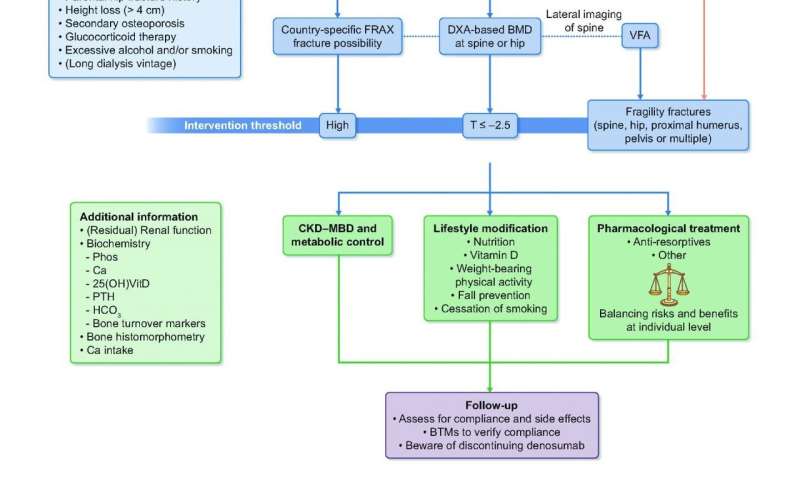
Patients with advanced chronic kidney disease (CKD) suffer from impaired bone quality and quantity, with a non-vertebral fracture risk which is 4-to 6-fold higher than the fracture risk of matched controls. However, due to the complexity and many challenges involved in diagnosing and treating osteoporosis in advanced stage CKD, there is an exceptionally high care gap, leaving these high-risk patients unprotected against potentially life-threatening fragility fractures.
In an effort to foster a paradigm shift with regard to osteoporosis care in CKD, the European Renal Osteodystrophy (EUROD) Working Group, bringing together expertise from the European Renal Association-European Dialysis and Transplant Association and International Osteoporosis Foundation (IOF) Committees of Scientific Advisors and National Societies, has published the “European Consensus Statement on the diagnosis and management of osteoporosis in chronic kidney disease stages G4-G5D”.” The Consensus provides a succinct review of current clinical practice and outlines practical recommendations for diagnosis, assessment of fracture risk, intervention thresholds, non-pharmacological and pharmacological intervention strategies, monitoring, and secondary fracture prevention through coordinator-based fracture liaison services.
Lead author, Dr. Pieter Evenepoel, Department of Nephrology of the University Hospitals Leuven, Leuven, Belgium stated, “Disturbances in mineral and bone metabolism occur early in the course of CKD and become almost universal in patients with advanced disease. Nevertheless, despite their very high risk of sustaining osteoporosis-related fractures, there is a vast osteoporosis care gap in these patients. Many clinicians are uncertain about the optimal diagnostic and therapeutic strategy and this may be fuelling inertia and a ‘wait-and-see’ approach in regard to osteoporosis care.”
The Consensus recommendations are timely and important given that chronic kidney disease is a rapidly growing problem worldwide. It is estimated that as much as 10-15% of the adult population is affected. In 2010, 284 individuals per million population were estimated to be undergoing maintenance dialysis (CKD G5D) globally, and this is on the increase given the rapid increase in chronic cardiometabolic diseases worldwide.
Professor Serge Ferrari, co-author and Vice-Chair of the IOF Committee of Scientific Advisors, added, “Recent studies suggest a similar efficacy of common osteoporosis drugs in patients with CKD G4-G5D as in the general patient population. We hope that the pragmatic consensus recommendations resulting from this successful collaboration between European societies, covering assessment, treatment and monitoring of bone health in renal disease, will serve to stimulate a proactive and cohesive approach to the management of osteoporosis in these high-risk patients.”
Source: Read Full Article